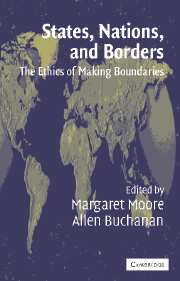Book contents
- Frontmatter
- Contents
- About the Contributors
- Acknowledgments
- 1 Introduction: The Making and Unmaking of Boundaries
- THE JEWISH TRADITION
- THE CONFUCIAN TRADITION
- 4 The Making and Unmaking of Boundaries: A Contemporary Confucian Perspective
- 5 Borders of Our Minds: Territories, Boundaries, and Power in the Confucian Tradition
- THE CHRISTIAN TRADITION
- THE NATURAL LAW TRADITION
- THE ISLAMIC TRADITION
- THE LIBERAL TRADITION
- THE INTERNATIONAL LAW TRADITION
- CONCLUSION
- Index
5 - Borders of Our Minds: Territories, Boundaries, and Power in the Confucian Tradition
Published online by Cambridge University Press: 24 November 2009
- Frontmatter
- Contents
- About the Contributors
- Acknowledgments
- 1 Introduction: The Making and Unmaking of Boundaries
- THE JEWISH TRADITION
- THE CONFUCIAN TRADITION
- 4 The Making and Unmaking of Boundaries: A Contemporary Confucian Perspective
- 5 Borders of Our Minds: Territories, Boundaries, and Power in the Confucian Tradition
- THE CHRISTIAN TRADITION
- THE NATURAL LAW TRADITION
- THE ISLAMIC TRADITION
- THE LIBERAL TRADITION
- THE INTERNATIONAL LAW TRADITION
- CONCLUSION
- Index
Summary
Introduction
Dan Bell has provided us with a comprehensive survey of Confucian treatments of territorial boundaries. Professor Bell has accomplished this task, moreover, despite the tremendous range that exists within what is considered “the Confucian tradition,” both temporally (over two millennia of interpretation and reinterpretation) and substantively (“neo,” “post,” “reformist,” “orthodox,” and so on). In this regard, Professor Bell has given us not only what the Confucian canons say on the subject of territories and borders (particularly in light of the different methods of boundary alteration discussed in the Introduction to this volume), but a taste of how contemporary societies in China, Taiwan, and Hong Kong draw on Confucian principles to decide policy issues.
At the same time, it is necessary to underscore the hybrid nature of “third world” traditions such as Confucianism. In our enthusiasm for multicultural equality (itself an artefact of Anglo-American liberalism), we must be careful not to wish away, inadvertently, the impact of almost five centuries of Western colonialism and imperialism on societies outside the West. One may note, for instance, that while Confucianism today has integrated liberal notions of “the public” as a distinct sphere of governance from “the private,” liberal theory shows no trace whatsoever of absorbing Confucian concepts such as filial piety or virtuous rule. Put differently, we cannot pretend that the political traditions of the colonized have developed in the same hegemonic fashion as those of the colonizers.
- Type
- Chapter
- Information
- States, Nations and BordersThe Ethics of Making Boundaries, pp. 86 - 100Publisher: Cambridge University PressPrint publication year: 2003
- 4
- Cited by



